
Originally published at Appstrail.com.
Appstrail is proud to join the Pledge 1% Movement and Pledges to Donate 1% of Time to the Community. We encourage other companies to take the pledge and leverage their business as a force for good.
Appstrail, a new-age Salesforce Consulting partner, has announced today that it has joined Pledge 1%, a global movement to create a new normal for companies of all sizes and stages to have a positive social impact through their business. It is joining over 12,000 companies around the world who have committed to Pledge 1% of either their product, profit, equity, and/or staff time to a charity of their choosing. It is proud to announce its commitment to donate 1% of its Time.
‘Opportunity for everyone is one of the 4 core pillars, here at Appstrail, on which the company was founded. We’ve always aspired to help businesses grow, innovate, and transform to bring about positive change with the use of technology. Being born during the pandemic, we understand more than anyone else the importance of “help & support” and our teams go out of their ways to help customers by donating time or pro bono. We’re small but agile and deliver a greater value to customers which helps us stand out. -Shomil Shetty, Co-founder & Head of Business, Sales & Strategy
About Pledge 1%
Pledge 1% is a global movement that inspires, educates, and empowers every entrepreneur, company, and employee to be a force for good. Over 12,000 members in 100+ countries have used Pledge 1%’s flexible framework to ignite half a billion dollars in new philanthropy. To learn more about Pledge 1% and to take the pledge visit www.pledge1percent.org
About Appstrail
Appstrail is a modern-day Technology consulting firm where everything we think is digital, for and across our customers’ entire ecosystem. It’s a commitment to provide access and means for the next generation of leaders, thinkers, believers and doers. We are centred around creating customer-centric experiences for our clients and help them digitally transform their businesses. Above all, it is an institution that creates multiple opportunities.
Our focus is on three key areas:
- Digital Enablement: We deep dive into Experience Management Solutions that helps our customers interact seamlessly with their end-customers and other stakeholders
- Digital Engagement: Our target is to streamline Internal Processes like Sales, Marketing, Operations, Customer Service, etc. and how they interact with customers
- Digital Experience: We help our clients transform their organization and help them tap into high-end consultants, technology know-how for their internal transformation project
Our mission is to help businesses grow, innovate, transform and become customer-centric organizations leveraging the best technology platforms.
As a team, Appstrail strongly believes in the famous quote by Ratan Tata.
“If you want to walk fast, walk alone. If you’re going to walk far, walk together.”
Within our organization, we aim to empower and support each one of us while collaborating toward common goals. Given a choice between optimal efficiency and a chance to learn something new, we choose to learn and grow.
To learn more about Appstrail’s program, visit Appstrail or LinkedIn.
Our Contribution
Seeding Labs is a non-profit organization, founded in 2008 and based in Boston, the USA. It equips scientists with tools and resources to nurture their talent and help the global moment. They have been receiving donations for a very long time. Even though they were using Salesforce for their day-to-day operations, they could not track the impact of donations (both in terms of equipment and money). Our team volunteered 250 hours to help them deploy “Donor Impact Reporting” to Production. They could generate 2 reports: Donor with Country Impact and Donor with Recipients. It helped them recognize the contribution of each donor and its impact and helped them promote more donations.
Pledge 1% resonates with our core principles. Therefore, it was time to join the global moment, empowering companies to become a force for good. As we grow, we hope to incorporate new and holistic initiatives to bring change and positively affect the society we live and thrive in. These are tough times and we’re doing our bit.
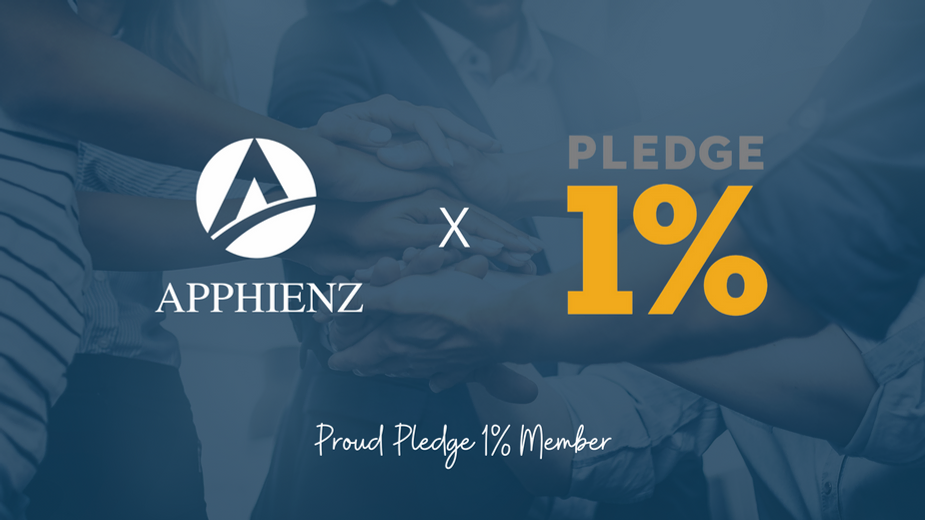
Originally published at Apphienz. Written by Piyusha Pilania.
Apphienz is now a Pledge 1% member and has pledged to donate 1% of its product, equity, and employee time to society. Pledge 1%, a philanthropic organization, is a universal gesture to create an environment where giving back and making a difference is ingrained in the very core of companies and organizations of all sizes right from its inception. It is a worldwide revolution that motivates, engages, and enables every entrepreneur, organization, and employee to be a constructive power in the universe. Pledge 1%’s flexible framework has sparked half a billion dollars in new generosity from over 10,000 members in 100 countries.
Apphienz is joining an impressive network of entrepreneurs and companies across the globe that have committed to philanthropic efforts through the Pledge 1% movement. By pledging 1% of its employee time, Apphienz is demonstrating a commitment to philanthropic leadership.
Change beings when your purpose meets the right organization!
At Apphienz we firmly believe in the act of kindness by giving back to the community. By becoming a member of Pledge 1% we will support the community with 1% of our employees’ time. How are we supporting our community? We are offering
Pro bono Salesforce consulting projects & training sessions
Mentoring sessions
Additionally, three volunteering days for all the employees
Moreover, as Salesforce consulting partners we support nonprofits 24×7 with our cost-effective solutions. We offer up to 40% discount on our prices to nonprofits. We have created special QuickStart packages for nonprofits so that they can leverage the Salesforce tech at an affordable price.
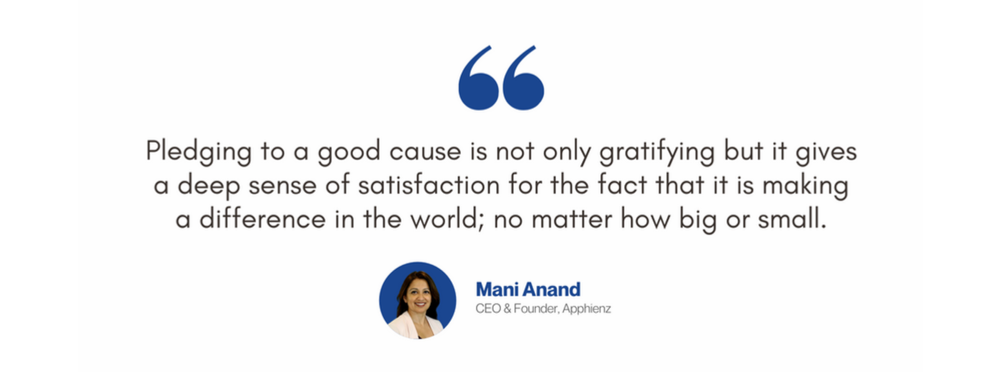
Our commitment towards society reflects in our actions. Apphienz is an inclusive company that celebrates women, more than 50% of our employees are females. Our exceptionally flexible and diverse work culture is a fine testament to that. Supporting women entrepreneurs, motivating youth, and solving complex challenges is at the heart of our company.
 Companies make a commitment to one, some, or all of the following ways
Companies make a commitment to one, some, or all of the following ways
A wise thought and action are all it takes to plant seeds of goodness and a giant tree will only multiply through the course of years and serve its sweet ripe fruits for the generations to come!
About Pledge 1%
Pledge 1% is an effort spearheaded by Atlassian, Rally, Salesforce, and Tides to accelerate their shared vision around integrating philanthropy into businesses around the world. Pledge 1% encourages and challenges individuals and companies to pledge 1% of equity, profit, product, and/or employee time for their communities because pledging a small portion of future success can have a huge impact on tomorrow. Pledge 1% offers companies turnkey tools and best practices, making it accessible for any company to incorporate philanthropy into their business model. To learn more or to take the pledge, please visit www.pledge1percent.org.
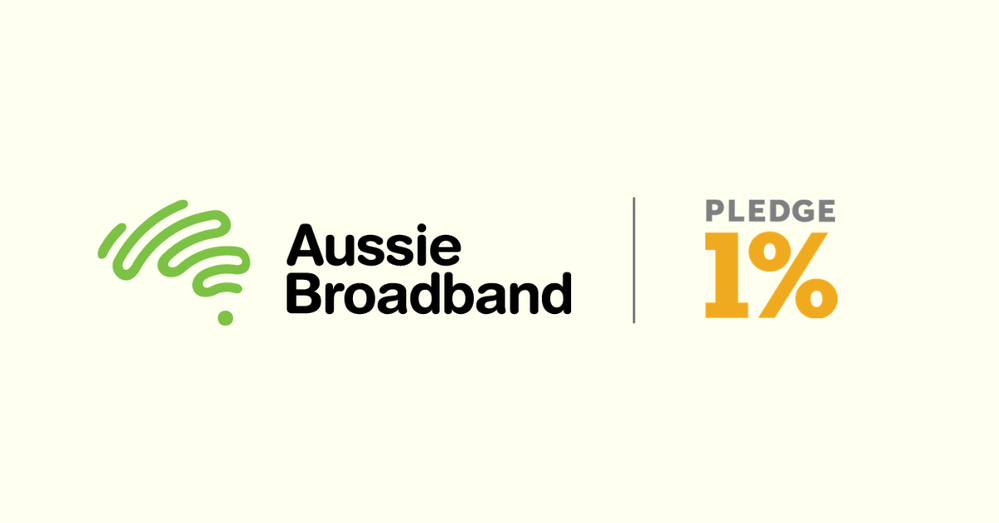
Originally published in IT Wire. Written by Alex Zaharov-Reutt.
Aussie Broadband has announced it has joined Pledge 1%, a global movement that encourages businesses to be a force for good.
Community Impact Manager, Caroline Kennon said Pledge 1% is simply about committing company resources to help improve communities.
“At Aussie Broadband, we’re in business to change the game. This includes how we, as a company, can make a positive impact on our community – both locally and nationally. This isn’t motivated by needing to tick boxes or big-noting ourselves – it stems from our value of being good to people and our strong Board and Senior Leadership Team commitment to community service,” said Kennon.
Pledge 1% participants have the freedom to pledge any combination of product, equity, profit, or time to whatever charity or cause they choose. Aussie Broadband is pledging up to 1% of staff time, driven largely through its generous 3 days of paid community service leave, and 1% Profit (EBITDA) through a combination of donations and sponsored internet connections.
One of the organisations that Aussie Broadband supports by providing broadband services is the Perth Observatory.
Matt Woods from the Observatory says Aussie has helped live stream astronomical events like the total lunar eclipse not only Australia, but to the world.
“We us use our Aussie Broadband connection not only for our day-to-day operations, but also to send back data on space junk from one of our telescopes to the US,” said Woods.
“It also allows us to store thousands of glass plates off-site on servers so they can be used for research and not lost for time. Students and researchers from around the world use our R-COP telescope for their research and studies. Aussie Broadband is allowing the observatory not only to be a gateway for Perth but for everyone around the world.”
Co-Founder and CEO of HoMie Clothing, Nick Pearce also thanked Aussie Broadband for its help.
“We’re an organisation that supports young people affected by homelessness and hardship to equip them with skills and experiences to help them prepare for their future.
“We’re super grateful to Aussie Broadband for their support in providing us internet access to facilitate our thriving e-commerce business,” Pearce said.
Pledge 1% Chief Executive Amy Lesnick said that as a global community, member companies are coming together to share ideas, tackle common challenges, amplify each other’s efforts, and to encourage their teams and partner ecosystems to do whatever they can to help in this immense time of need.
“This level of collaboration has the potential to drive significant social impact, unlocking millions in funding, product donations, and talent to support frontline workers and to address increasingly critical issues around racial injustice, mental health, small business viability, and education.
“Together, we are a force for good.”
More about Aussie Broadband’s Community Impact initiatives is here.
More about how Aussie is making an impact via Pledge 1% is in the video below:
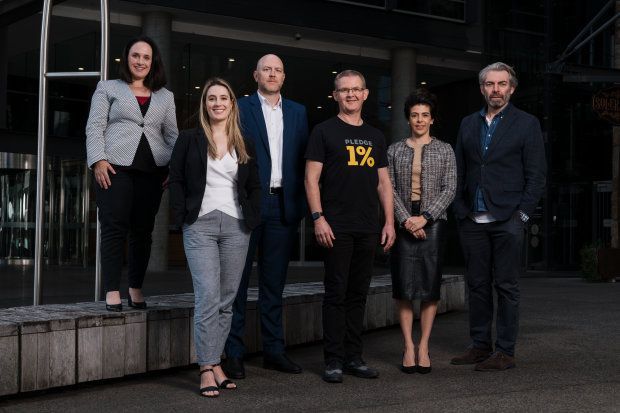
Originally published at The Australian Financial Review. Written by Natasha Gillezeau.
Atlassian has signed on to a new deed of equity, created by its charitable foundation, which it is hoping other companies will also sign, to make it legally enforceable to make good on public pledges of donations.
The Australian tech giant co-founded the Pledge 1% movement in 2014, with the idea being that participating companies agree to donate 1 per cent of their equity, profits, time and/or products to non government organisations.
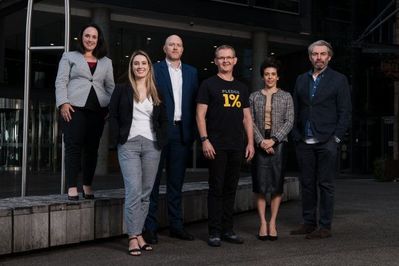 Myra Beal and Elizabeth Henderson of Herbert Smith Freehills, Jonathan Malone of PwC, Mark Reading from the Atlassian Foundation, Sonia Kew from PwC and Peter Dunne from Herbert Smith Freehills have all been instrumental in developing the legal deed to enforce payment of corporate charitable pledges. (James Brickwood)Until now, such pledges were not legally enforceable in Australia, but this new deed of equity changes this, and if implemented gives such promises greater weight.
Myra Beal and Elizabeth Henderson of Herbert Smith Freehills, Jonathan Malone of PwC, Mark Reading from the Atlassian Foundation, Sonia Kew from PwC and Peter Dunne from Herbert Smith Freehills have all been instrumental in developing the legal deed to enforce payment of corporate charitable pledges. (James Brickwood)Until now, such pledges were not legally enforceable in Australia, but this new deed of equity changes this, and if implemented gives such promises greater weight.
Atlassian Foundation head Mark Reading worked together with his former employer, PwC, Herbert Smith Freehills, and Australian Philanthropic Services to help work out what legal instrument would work best for Pledge 1%-ers, and also to check that formalising this corporate giving would not inadvertently trigger additional tax obligations. Typically, charitable gifts are tax deductible.
Under the deed, start-ups and companies must pick what charity they want to donate their pledges to. The need to donate the gift is triggered by any major liquidity event, like an initial public offering, that happens within 10 years of signing the deed.
Atlassian Foundation head Mark Reading described the Pledge 1% movement as a “simple framework for baking social impact into the DNA of an organisation,” but said until now, the movement has lacked “real incentives” to get founders to follow through on donating their equity.
Atlassian co-founder Scott Farquhar hired Mr Reading to lead the philanthropic branch of his company about five years ago.
Mr Reading said his passion for corporate social responsibility was not motivated by any particular faith or philosophy, but rather, his early experiences growing up in a lower middle-class Sydney household and seeing the power of education and opportunity to change lives for the better.
“I personally think all businesses have a responsibility to be positive contributors to society,” he said.
“If all you’re focused on is returns to shareholders – with all due respect to Milton Friedman – I think you’re failing as a company.
“But clearly there are all sorts of business benefits as well – these are secondary – but there are other benefits in having a very clear, positive purpose underpinning what you do as an organisation.”
Cangler steps forward
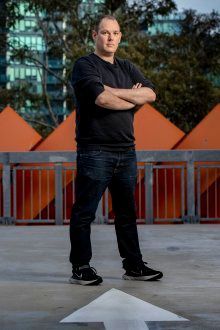 Andrew Herbert, founder of data analytics and artificial intelligence start-up Cangler, is the first to execute the deed. (Arsineh Houspian)
Andrew Herbert, founder of data analytics and artificial intelligence start-up Cangler, is the first to execute the deed. (Arsineh Houspian)Andrew Herbert, who is the founder of data analytics and artificial intelligence start-up Cangler, is the first to execute the deed.“I found the Pledge 1% movement from doing some Googling, and I thought it was awesome,” he said.“I really wanted Cangler to be a ‘giving’ company, the idea being that we don’t exist as a traditional company to generate profit for shareholders, but rather, I wanted the community to be shareholders, so that our success is everyones’ success.”
Mr Herbert said he had a privileged upbringing, but that various volunteering efforts and losing a close friend to suicide exposed him to social issues that he could not ignore.
He said he found too much cognitive dissonance between focusing on profit margins in his corporate day jobs, and finding sleeping bags for people in his volunteering work by night.
He decided to find a way of merging his work and interests closer together.
Three years ago, Mr Herbert quit his job in Melbourne and moved to Germany. He wanted to develop a way of applying his technology skills to help solve problems like poverty, disease, and climate change.
On Cangler, one example of this in action is an open platform community for health scientists to progress their research by enabling them to better collaborate and share data sets, kind of like how Wikipedia works, but for treatments and cures to tough diseases.

Originally published on Protocol. Written by Biz Carson.
SPACs may have been the hottest IPO trend in the last year, but now a bunch of investors are hoping to make another aspect of going public just as cool: corporate philanthropy.
The blockbuster IPOs of companies like Coinbase and UiPath came with a pledge to set aside shares of the company for charity. This week, over 40 investors, including folks like Benchmark’s Peter Fenton and SV Angel’s Ron Conway, joined Pledge 1% as boardroom allies to help their portfolio companies follow the same path.
- UiPath’s CEO Daniel Dines heard about Pledge 1% during a Forbes event when he was talking to other CEOs who had gone through the process, like those from PagerDuty and Atlassian. The company had already engaged in some philanthropic activities through a nascent foundation, but when UiPath went public, it set aside nearly 3 million shares to be reserved for philanthropy as part of its new pledge.
- “When you look at the long list of amazing companies that are part of Pledge 1%, Salesforce included, this isn’t a new unproven approach to charity,” said UiPath CMO Bobby Patrick. “It’s actually quite well-proven, and in our view, this is what every up-and-coming tech company should be doing as a normal course of business.”
Companies need support to become effective in their philanthropy, said Amy Lesnick, CEO of Pledge 1%.
- “We really see a time that’s not so far away when setting aside equity for your philanthropy is really just as common as setting it aside for your employees. It’s just what people do,” she said. “To make that happen you need standards, you need an ecosystem of support and you need to make it easy.”
- Recruiting VCs to evangelize corporate giving is just the start. UiPath board member and CapitalG partner Laela Sturdy had often fielded questions from founders about how they should be giving, but it wasn’t until UiPath that she realized Pledge 1% had a playbook ready to go. “I’ve brought it up proactively with so many founders I work with and they’re just relieved,” she said.
It’s just one way the tech industry is trying to use its power and newfound wealth for good.
- When Airbnb went public, hundreds of Airbnb employees signed a pledge to donate proceeds of the IPO to charity. “So much of the conversation around tech company IPOs focuses on how the newfound wealth will be used for consumption,” Janet Frishberg, a recruiter for Airbnb from 2013 to 2019, told me at the time. “I was wondering if we could change that conversation and have at least part of the focus be on how we can give these newfound resources to help others and help our local communities and also help the world.”
- Investors are playing other roles too. Bloomberg Beta’s Roy Bahat also helps run a program through Stanford that’s meant to educate early startup employees on how to manage their wealth in an impactful way.
It’s not only good for the world, but it’s also just good for business, said Accel’s Rich Wong, who sits on UiPath’s board.
- The tech industry used to see itself as a niche upstart, but that’s changed. Companies who have seen this tremendous growth have a responsibility to give back, he said. “We have an obligation as a community to our communities,” Wong told me.
- There’s also a competitive advantage when it comes to hiring: “In the battle for the best talents, they want to work for a company that has a mission and has a heart, that’s not just about value maximization,” Wong said.
- UiPath agrees: “Not only is this at the heart of how our founder thinks, but our employees and our new employees coming to work for us, they want to work for a company that gives back,” Patrick said. “They care about the environment and social responsibility, and investors now care about corporate governance and ESG.”
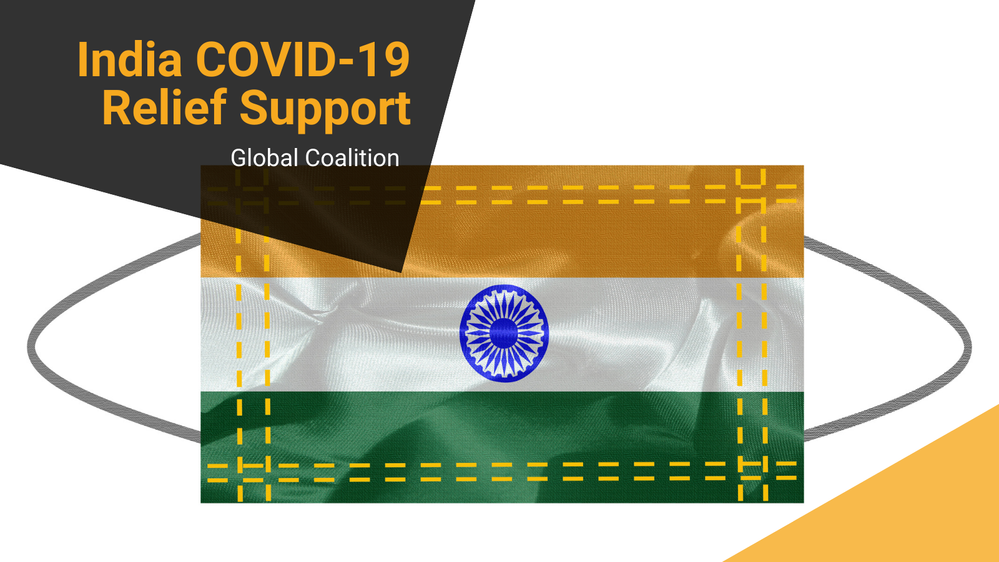
Early this week, we announced the collective effort of our Global Coalition to support organizations responding to the ongoing COVID-19 crisis in India. Together, we have unlocked over $28M worth of donations from the Bay Area and globally to address the need for medical supplies, food relief, and vaccine awareness and distribution.
We are grateful for the immense support this coalition has shown, and to the many companies who have helped drive this impact in India and beyond, including: Adobe, Appfire, Atlassian Foundation, Auth0, Autodesk, Box, Cisco, Coupa Software, Crunchbase, DocuSign, Dropbox, EdelGive Foundation, Flexport, GitHub, HP Foundation, LogMeIn, Lookout, Marqeta, Medallia, NetApp, Okta, Inc., PagerDuty, Palo Alto Networks, Pledge, Pledge 1%, Puppet, Inc., Pure Storage, Rand Properties, Remitly, Salesforce, SAP, ServiceNow, Silicon Valley Bank, TIBCO Software Inc., Twilio, Uber, Upwork, Unity, VMware, Vodafone Americas Foundation, Walmart, Western Digital, Workday, and Zoom Video Communications.
This initial commitment between 43 companies has inspired more companies around the world to initiate their own efforts, including GyanSys, Brite Systems, NeuNet Consultants, Fury Group, CSA Consultants Pvt Ltd, Warlows Legal, Synaptics, and Unbounce. It’s clear that COVID-19 knows no borders, and we are extremely proud and grateful to our members who continue to pledge their support to communities that need it the most.
We greatly appreciate your participation and ongoing leadership. If you are interested in contributing to this initiative, visit Go Give One or you can read more about the organizations and causes we are supporting in our earlier announcement here.

The New Builders: Face To Face With The TRUE Future Of Business
People starting new businesses today are not who you think they are. Contrary to the myth of the white, male tech founder that dominates our mindshare, most new businesses are started by people who are Black, brown, female, and older.
The number of women-owned businesses has increased 31 times between 1972 and 2018 (in 1972, women-owned businesses accounted for just 4.6% of all firms; in 2018 that figure was 40%). The fastest-growing group of female entrepreneurs is women of color, who are responsible for 64% of new women-owned businesses being created. We believe women will soon make up more than half of the entrepreneurs in America. The age of the average American entrepreneur also belies conventional wisdom: It’s 42.
These New Builders are redefining our business landscape while creating success on their own terms, in businesses that allow them to pursue their passions and to support their communities and families. But we’re failing to support this next generation of entrepreneurs and as a result, entrepreneurship in the United States – despite popular belief – has been declining.
“Examining the deep history of entrepreneurship in this country, often driven by women, immigrants and people of color, The New Builders tells the stories of the unsung entrepreneurs of yesterday and today. In so doing, the book makes a compelling case that these entrepreneurs should have access to the funds and networks that they need to nurture and grow their businesses.” – Katharine Weymouth, Former CEO and Publisher, The Washington Post
Check out updates about book releases, media interviews, and social updates through their Twitter, Instagram, Facebook, and LinkedIn.
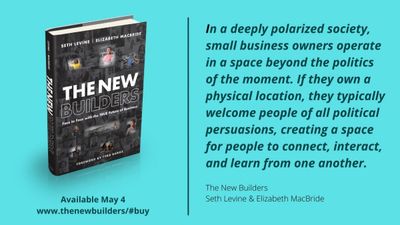
About the Authors
Seth Levine is a partner and co-founder at the Boulder, CO,-based venture capital firm Foundry Group, which as of the end of 2020 had almost $3 billion in assets under management. In addition to his work at Foundry, Seth actively supports entrepreneurs around the country and across the world. He co-founded Pledge 1%, a global network of companies that have pledged equity, time, and product back to their local communities. He is an advisor to funds and to companies around the globe. Seth blogs regularly about venture capital and the capital markets at sethlevine.com.
Elizabeth MacBride is an award-winning business journalist and the founder of Times of Entrepreneurship, a new publication telling the stories of entrepreneurs beyond Silicon Valley. A former managing editor of Crain’s New York Business, her work has appeared in Forbes, Newsweek, The Washington Post, Quartz, HBR.com, and many others. Elizabeth was a writing fellow at the UN’s Office of the Quartet in Jerusalem and was named a rising leader by the Aspen Institute’s Socrates Program. She is journalist-in-residence at MIT’s Legatum Center for Development & Entrepreneurship.
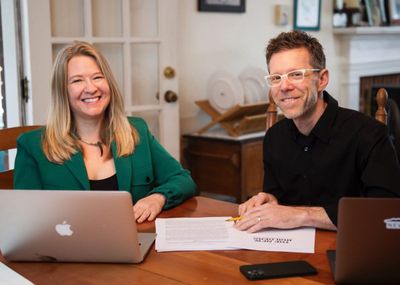 Elizabeth McBride and Seth Levine – The Builders
Elizabeth McBride and Seth Levine – The Builders
Contact: David Hahn (Media Connect) at david.hahn@finnpartners.com

Originally published at Australian Baiju.
Our team at Good Spirits Co. was so proud to participate in ‘Variety Rocks 4 All Concert,’ a family concert held by Variety – the Children’s Charity in conjunction with the City of Sydney.
For 45 years Variety – the Children’s Charity has been helping to give kids (aged 0-18) who are sick, disadvantaged or have special needs a fair go in life. Their work allows kids to gain mobility, to get out and about in the community, to communicate, achieve independence and increase their self-esteem.
The Variety concert was held at Tumbalong Park (Sydney) on Saturday 1st of May 2021. Families were entertained by some of Australia’s best entertainers, cultural music acts and some award winning country music artists. This event was made possible thanks to the incredible generosity of City of Sydney, who granted $50,000 to run this event through their COVID-19 Recovery CBD Activation Grant.
Good Spirits Co. team gave a helping hand with event ad hoc duties and entertainment. One of our Co-founders, Varvara Kuraeva, had an “unforgettable and fun experience” wearing an Olaf costume entertaining kids and dancing to the country tunes.
But the work doesn’t stop there. We look forward to supporting Variety and families in every way we can. To find out more about Variety – the Children’s Charity or to join, please visit https://www.variety.org.au.
About Pledge 1%
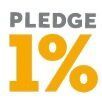
Good Spirits Co. has been a proud member of the Pledge 1% movement since 1st of February 2021. We have pledged to donate 1% of time and 1% of profit to different Australian charities.
Pledge 1% is a global movement that inspires, educates, and empowers every entrepreneur, company, and employee to be a force for good. Over 12,000 members in 100+ countries have used Pledge 1%’s flexible framework to ignite half a billion dollars in new philanthropy. To learn more about Pledge 1% and to take the pledge, visit www.pledge1percent.org.
‘Variety Rocks 4 All Concert’ at Tumbalong Park. On the photo: Good Spirits Co. team rocking the red volunteer t-shirts and Olaf costume. Go Team!
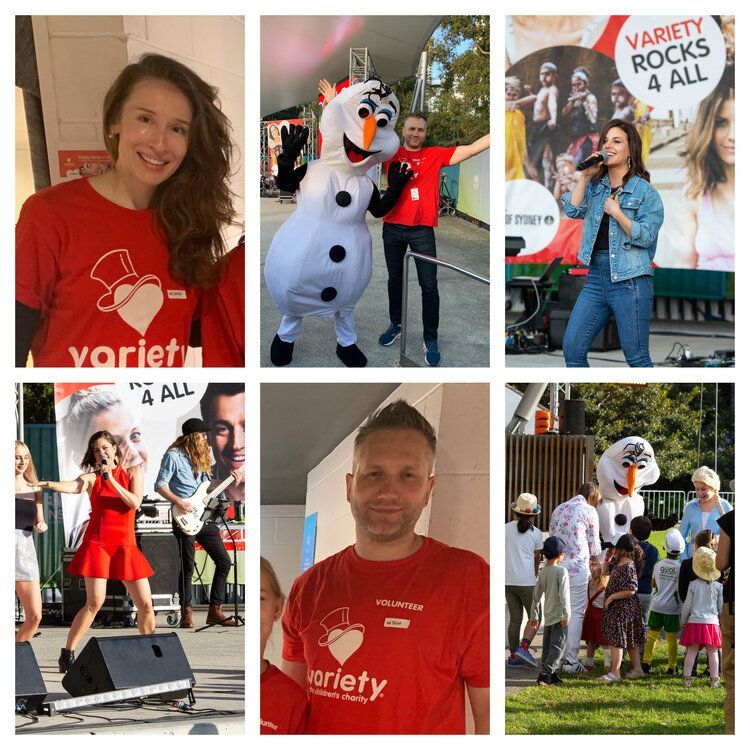 ‘Variety Rocks 4 All Concert’ at Tumbalong Park. On the photo: Good Spirits Co. team rocking the red volunteer t-shirts and Olaf costume. Go Team! Originally posted: May 6th, 2021
‘Variety Rocks 4 All Concert’ at Tumbalong Park. On the photo: Good Spirits Co. team rocking the red volunteer t-shirts and Olaf costume. Go Team! Originally posted: May 6th, 2021
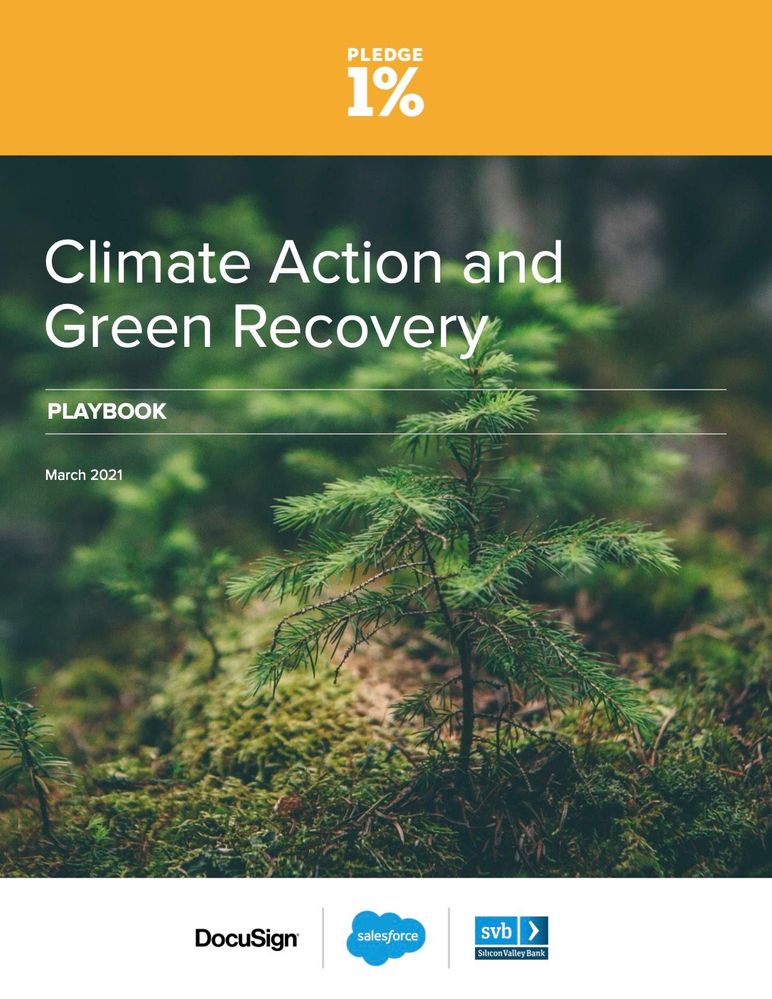
To celebrate the launch of our Climate Action & Green Recovery Playbook, Pledge 1% members joined DocuSign, Salesforce and Silicon Valley Bank to discuss their experience building and maintaining successful sustainability programs. In case you missed it, below is an overview of the discussion.
You can download our Climate Action & Green Recovery Playbook here.
In addition to the immeasurable effects of COVID-19, this past year we experienced record breaking wildfires, hurricanes, freezes, and flooding — and a toll on human life and resources that will only continue to climb. We now have the scientific data to understand the devastation that climate change can cause; and for most of us, this devastation will occur during our lifetime or the lifetimes of our children.
At Pledge 1%, we are committed to protecting the planet. We organized a special members event to explore the top questions and challenges we are facing, and to discuss ways companies can be a part of the solution. We were delighted to share ideas from our members and learn from environmental champions and guest speakers Amy Skeeters-Behrens from DocuSign, Emma Grande from Salesforce, and Danielle Conkling from Silicon Valley Bank.
Here are our 3 top takeaways from the event:
- Engage with the communities where your employees live and work. Research how you can get involved with local stakeholders that are working to protect the environment.
- Start with your employees! Many members share that their employees have expressed interest in getting involved with sustainability efforts. Send a company-wide poll to brainstorm ways for your company to get involved in protecting the planet.
- Take stock of what your company is uniquely positioned to offer, and build a program around that. Leverage your existing talent and assets to help you grow your sustainability program.
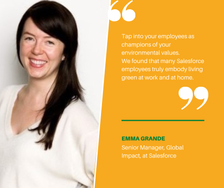
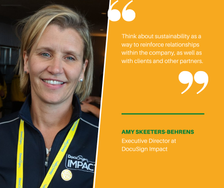
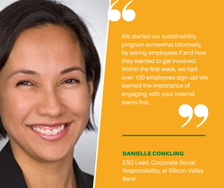
Missed the event? That’s OK – you can watch the recording here: